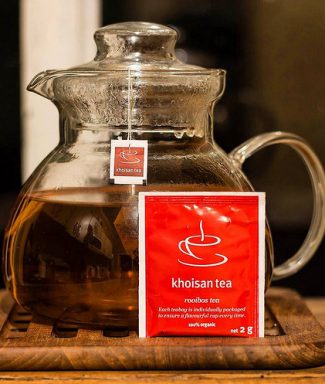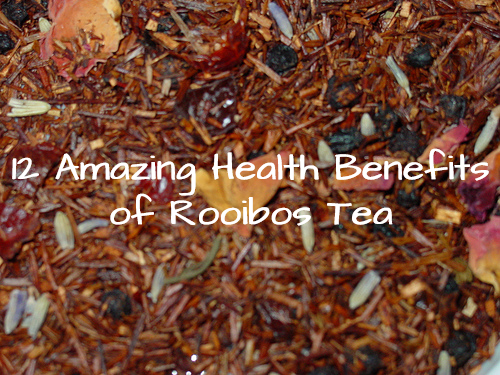Although rooibos tea hasn’t yet gained the wide-spread popularity and reputation of green tea or matcha, it may have have even more health and beauty benefits including being chock full of antioxidants, naturally caffeine free and absolutely delicious.
The rooibos plant is an evergreen plant of the legume family that is found in South Africa. It is most known for its leaves that are infused to prepare a tea. Due to its color, this tea is also called red tea (especially in England). In South Africa it is mainly called bush tea.
Rooibos is grown in the mountainous region of Cederberg in Western Cape. The leaves of this plant are fermented or oxidized that enhances the flavor of the leaves and changes the color to red. When not oxidized these leaves are green in color and can also be infused to make green rooibos tea.
The Health Benefits of Rooibos Tea
Since Rooibos is mainly consumed in the form of red tea, most of the benefits derived from this super herb are listed below.
Fights free radicals
Some processes that take place in the body give out free radicals that can be harmful. The large amounts of antioxidants contained in rooibos help in fighting off these free radicals that attack healthy cells in order to stabilize themselves. Polyphenols, aspalathin and nothofagin also help in fighting health conditions that can arise from a large number of free radicals. (ref: http://www.sciencedirect.com/science/article/pii/S0378874104004519)
Helps manage insomnia
A warm beverage is a great option for those who suffer from insomnia. However, caffeine excites the nervous system and is not really a recommended option for those who are trying to get some rest. Rooibos tea, on the other hand, is completely free from caffeine and is therefore prescribed for insomnia. Reduction of caffeine in diet on a daily basis can also help reduce stress and improve overall disposition.
Reduces high blood pressure
Since rooibos relieves stress, it is a great beverage to consume for those who suffer from hypertension. (ref:https://link.springer.com/article/10.1007/s00394-006-0620-0#page-1) Also known as a bronchodilator, rooibos helps in ensuring that reduction in overall blood pressure can also lead to better heart health.
Strengthens bones
Among other nutrients, rooibos is also rich in calcium, fluoride and manganese. These are key elements that are required for healthier and stronger bones. Consuming red tea can help in preventing bone-related issues like chronic joint pain, arthritis or osteoporosis. While fluoride helps in hardening teeth, manganese helps by activating enzymes that help in bone development and repair. (ref: https://link.springer.com/article/10.1007/BF02858780#page-1)
Encourages a healthier heart
Not only does rooibos help in reducing high blood pressure, it contains quercetin, a powerful antioxidant associated with preventing various kinds of heart conditions. It has anti-inflammatory properties too. (ref: http://www.sciencedirect.com/science/article/pii/014067369392876U)
Helps manage blood sugar
 For those who battle issues with blood glucose levels, the health benefits of rooibos tea can help. The rare antioxidant (aspalathin) found in rooibos is responsible for better management of blood sugar among those who have diabetes mellitus. Activation of insulin secretion, better insulin resistance and regulated absorption of glucose from food.
For those who battle issues with blood glucose levels, the health benefits of rooibos tea can help. The rare antioxidant (aspalathin) found in rooibos is responsible for better management of blood sugar among those who have diabetes mellitus. Activation of insulin secretion, better insulin resistance and regulated absorption of glucose from food.
Better management of blood sugar levels means that there are lower number of spikes and lows in blood sugar levels, thereby ensuring that blood with high sugar levels does not damage various other organs that it travels to. (ref: https://dx.doi.org/10.1016/j.phymed.2008.11.009)
Alleviates skin conditions
Alpha hydroxyl acid and zinc are the two nutrients in rooibos tea that are responsible for better skin. While consuming red tea will help achieve better skin and complexion, applying red tea powder directly on the skin maybe the solution required for stronger issues like acne, sunburn and pimples. Alpha hydroxyl has also been known to reduce wrinkles and other signs of aging.
Option for those with kidney stones
People with a recurring problem of kidney stones are asked to limit the consumption of tea as it contains oxalic acid that can lead to calcium oxalate stone formations repeatedly. Since red tea does not contain the crystal forming oxalic acid, it is a great alternate for those who want to drink tea.
Alleviates allergies
While this has not been proved in medical experiments and trials, rooibos has been used extensively in South Africa to help manage hay fever, eczema and other similar allergies. The added anti-inflammatory properties of this tea have lead people to believe that it may be great for asthma patients too. (ref: http://www.ncbi.nlm.nih.gov/pubmed/21625024)
Relieves stomach complaints
Another of the health benefits of rooibos tea includes the fact that abdominal pains like stomach cramps, indigestion, cramps or diarrhea can be managed naturally with the use of red tea. Consumed over time these recurring issues tend to get cured completely. The activated potassium present in rooibos helps in reducing any hyperactivity in the gastrointestinal tract.
Circulation
The antioxidant chysoeriol present in rooibos helps in improving circulation and keeping those enzymes at bay that can otherwise trigger cardio vascular diseases. (ref: https://www.ncbi.nlm.nih.gov/pubmed/26151031)
Better iron absorption
Since it has no tannins, rooibos helps in better iron absorption in the body.
In addition to the important health benefits of rooibos tea mentioned above, rooibos also contains a large number of nutrients that help in maintaining good health. Magnesium for good nervous system health, calcium for strong teeth, zinc for good metabolic health and iron for better oxygen distribution are all present in rooibos.
Nutritional Information about Rooibos
Rooibos is extremely rich in ascorbic acid. It has extremely high levels of antioxidants like aspalathin and nothofagin; phenolic compounds like flavanols, flavones and dihydrochalcones. Once processed, the leaves contain various cinnamic acids and hydroxylated benzoic. Unlike other teas and coffee, it has extremely low levels of caffeine and tannin.
Rooibos tea provides the following nutrients per 200ml of serving:
|    Iron                              0.07mg |
|    Potassium                   7.12mg |
|    Zinc                              0.04mg |
|    Manganese                0.04mg |
|    Copper                        0.07mg |
|    Calcium                      1.09mg |
|    Sodium                       6.16mg |
|    Magnesium               1.57mg |
|    Flouride                     0.22 mg |
How to Prepare Rooibos
Traditionally rooibos tea is prepared like black tea along with a dash of milk and sugar to taste. This the most common method of making this tea. However, as it has become popular across the world, various other creations have also become popular.
Some people prefer to consume this red tea with honey and lemon. The tea is infused in hot water and then honey is added in with a dash of lemon.
Not only this, the popularity of this herb has led some of the coffee shops to offer ‘red espresso’, ‘red lattes’ and ‘red cappuccinos’. Iced tea and other variants like London Fog or Cape Town Fog (rooibos, milk and vanilla syrup) are also becoming popular.
Photo by larryjh1234
Photo by KingTyrone 


 Fill out the form below to sign up to our free natural health and healing newsletter and stay up to date on our latest articles about holistic healing therapies and effective home remedies for common ailments. As a thank you for joining our newsletter, we’ll also send you
Fill out the form below to sign up to our free natural health and healing newsletter and stay up to date on our latest articles about holistic healing therapies and effective home remedies for common ailments. As a thank you for joining our newsletter, we’ll also send you